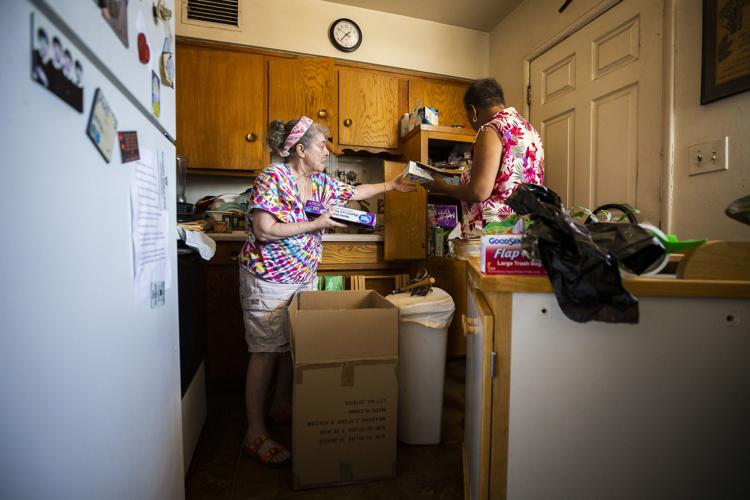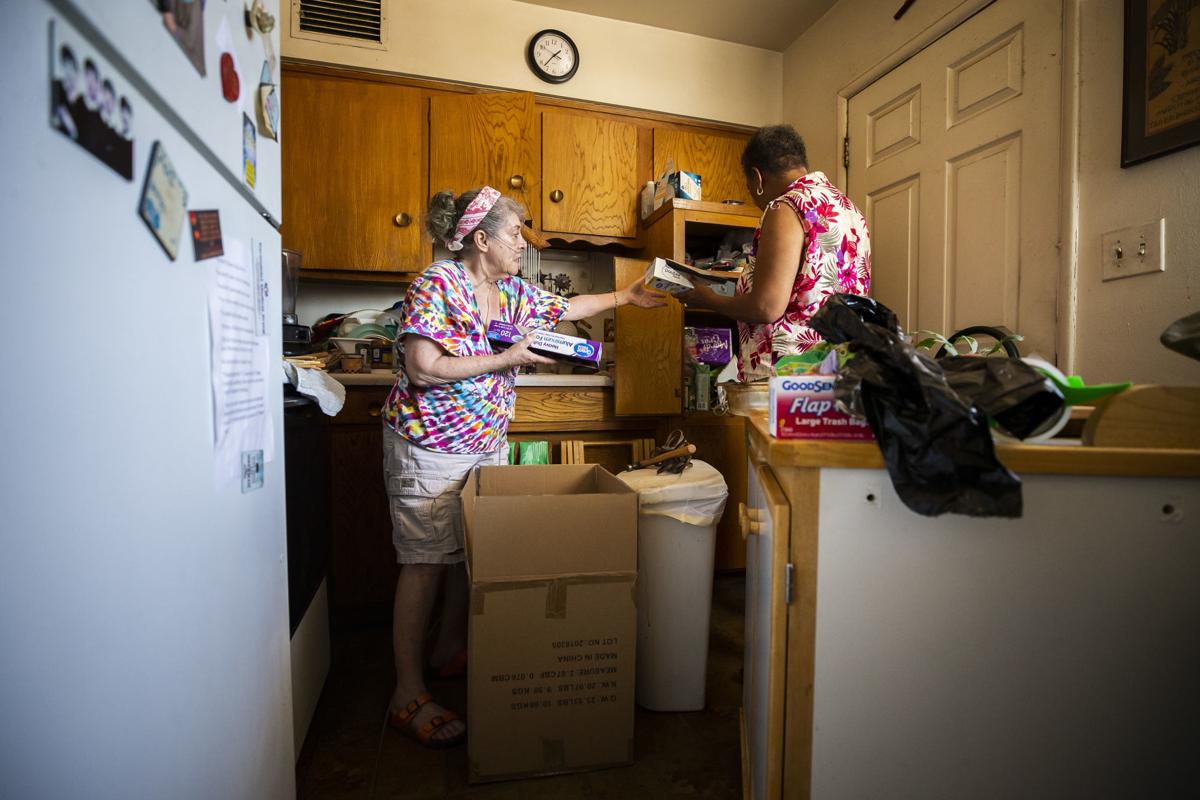When the letter arrived earlier this summer, Lily Rose Krugly had been living in the duplex for 15 years.
Krugly, 74, liked her home, knew many of her neighbors and enjoyed compliments about the potted garden she lovingly maintained along her walkway.
But when the time came to renew her lease, the new property owner informed her in writing that she had to move. She asked around, found out no one else was being denied a new contract and realized it’s because she uses a Section 8 housing voucher to help cover her rent.
Her story is one that’s playing out across Tucson, as rent prices increase and hundreds of people are being displaced.
The problem — which mostly hurts the working poor, people with disabilities and seniors living on fixed incomes — is one that commonly accompanies improving housing markets.
What’s compounding Tucson’s crisis is that the city’s housing program is in flux, with a lot of staffing turnover, high caseloads and, according to some landlords and property owners, payment and paperwork delays.
Krugly is one of several Ward 6 residents Tucson City Councilman Steve Kozachik has heard from recently. The stories vary, he said, but they almost always include these factors: vulnerable people, rising rents and an overburdened system.
Another elderly woman from a different area in his ward told Kozachik she had to move even though she could pay the rent increase. The reason? Paying more of her own money would put her at risk of losing the Section 8 voucher she needed.
Section 8 recipients are not supposed to spend more than 30 to 40% of their overall income on housing, a policy that’s in place to ensure people are paying what they can afford.
“Once the rent is agreed upon, the resident is not to pay more than what their initial portion would be,” said Liz Morales, Tucson’s interim housing director, who will join the city staff full time in October.
People who have to move are given 60 days to find a new rental before they lose their vouchers, said Morales, who worked as housing director in Mesa for four years after overseeing Section 8 housing in Phoenix for six years.
However, she said if recipients have searched and not yet found a new place to live, extensions are possible.
It took Krugly several weeks to figure out where to move. She made several hundred phone calls to property owners and landlords who were listed on outdated government sites and found that very few were taking Section 8 vouchers anymore.
And the ones who were didn’t have any vacancies.
“The issue is that when rents are increasing, like they are right now, landlords tend to be less interested in the (Section 8) program,” said Albert Elias, assistant Tucson city manager. “Unfortunately that coincides with when tenant needs are the greatest.”
As just one example, phone calls from people searching for a new place to live are now constantly flooding the office of Angela Vasquez, who manages a 97-unit apartment complex for a nonprofit called Family Housing Resources.
“It’s heartbreaking,” she said, explaining there’s no room at her complex. “They are looking for housing, but no one will accept them.”
Krugly finally found a new apartment with help from Kozachik and she’s grateful, even as she misses her longtime home.
“I’m over being worried about where I’m going to sleep next week,” she said. “Now I’m pissed and I want action.”

Krugly points to the notice she received from her landlord. Rising housing prices are forcing many Section 8 tenants to look for new places to live.
A national issue, a Tucson issue
Kozachik doesn’t begrudge landlords raising rents or becoming frustrated enough by late Section 8 payments to quit the program.
“If we are part of the reason why landlords are no longer participating, we need to fix that,” he said. “We can’t expect landlords to participate in a program that’s not working.”
Several property owners interviewed by the Arizona Daily Star said management inconsistencies and payment delays have made them wary of the program and, since the market is doing well, they are opting to quit housing tenants who rely on assistance.
Some have contacted city officials already, including Mayor Jonathan Rothschild, who said landlords have told him of significant delays in Section 8 payments.
“If the market is shrinking, there are reasons,” Kozachik said. “The demand certainly is not shrinking, nor will it any time soon.”
Under the program’s guidelines, payments can take up to 60 days to be received, a grace period that’s factored in to allow new tenants or property owners enough time to get paperwork and tax information completed.
When the city is late on its payments, Morales said that could be for a number of reasons, including new ownership of a complex, new tenants moving in and the time it takes to draw up contracts and leases.
“Requests for rent increases, which have been taking longer than we would like, is a common reason for late payments,” she said.
“We are examining our internal processes to identify how to shorten the time for issuing payment. The good news is once the payment is released, the monthly payments are always on time.”
About 4% of the city’s Section 8 payments were more than 60 days late in August. Morales, who met with Pima County and city leaders last week, said she is aiming to have that fall to 1% for September. Data on how often the city was late during the earlier months this year was not available in time for this report.
City Councilman Paul Durham and Lauren Romero, local executive for the Arizona Multihousing Association, both said Tucson’s housing problems have been building for years.
“Four years ago, we were saying, ‘Hey, we will need to fix these problems before the market improves’ and now here we are,” said Romero, whose organization represents landlords throughout the state.
“It’s a national issue, not just here in Tucson, but we are hearing about it a lot here.”
Including Morales, the city has had three different housing directors during the last year.
Elias, assistant city manager, said positive changes are expected now with Morales’ leadership.
“Liz and her team are drilling down, trying to improve training, trying to approve accountability, trying to make sure our records are accurate,” he said. “All of those things are fundamental to making the customer service effective and as good as it can be.”
At a meeting last week, Morales said officials talked about collecting more data to get a better grasp on the problems and how to solve them by reorganizing “to ensure landlords and tenants are assisted in a timely manner.”
“We also want to see what can be done to make the rental limits for the program to be more competitive with market rents,” she said.
In addition to improving operations, Kozachik also suggests infusing the housing program with money from the city’s general fund to speed up payments and thereby keep more Section 8 options available by preventing more landlords from leaving.
Morales said that while the Section 8 program only allows federal funding for the vouchers, “there are other programs that provide rental assistance that use state or other federal funding programs that look like the voucher program.”
“Each program has its own rules and policies,” she said. “I am not aware of any other funds that are currently being used for rental assistance.”
“Not a decision we made lightly”
One local property management company, Quarterpenny, used to take Section 8 vouchers, but five out of the six property managers recently phased it out after working with the city became a burden on office staff and accounting.
The issues included delayed responses on renewals, late payments and changes in deadlines, said Quarterpenny’s portfolio director, Elizabeth Beaulieu.
Phasing out happened over time, Beaulieu said, and started about three years ago when they stopped accepting new residents who were using the vouchers.
Then, over the last 18 months or so, three of the property owners stopped renewing section 8 leases. Currently, only one still allows Section 8 lease renewals.
“We feel for the residents,” she said. “It’s not a decision we made lightly.”
Section 8 tenants with good rental histories can almost always find a new place to live, said Morales, but it probably won’t be as desirable.
“If a person has a voucher and they are actively looking and they have a good rental history, they are going to find a unit,” she said. “If they have a bad rental history, they are going to have a hard time.”
It’s an issue that can be especially challenging for seniors.
The Pima Council on Aging has been receiving more calls from Section 8 recipients who need to move, but don’t know where to go or how to get there, said Mark Clark, the agency’s chief executive officer.
There’s no public funding source he knows of to refer them to for moving help and so, often, Pima Council on Aging representatives try to help callers think of resources they may not have thought about yet, such as members of their faith community.

Krugly’s story is one that’s playing out across Tucson as rent prices increase, displacing hundreds of people. The problem commonly accompanies improving housing markets.
Finding few places to turn was one of the most frustrating parts for Krugly, who has now been in her new apartment about a week.
There were few resources online that were helpful, Krugly said.
The online waiting list for Section 8 vouchers, currently at 9,155 people, has been closed since 2016. Morales said the lists close or open depending on how much funding and help is available.
“To administer a wait list requires a lot of administration to locate and communicate with the applicants,” she said. “We currently are serving those who applied over three years ago.”
Morales encourages landlords and property managers to check back in regularly. She also urges people who are currently on the waiting list to report any changes in address or contact information so city workers can find them and process their eligibility.
Beaulieu said her company would be open to taking the residents again, if things improve.
“We’re excited Liz Morales is here now,” she said. “We’re hoping she can turn things around for the sake of the residents and the management.”







